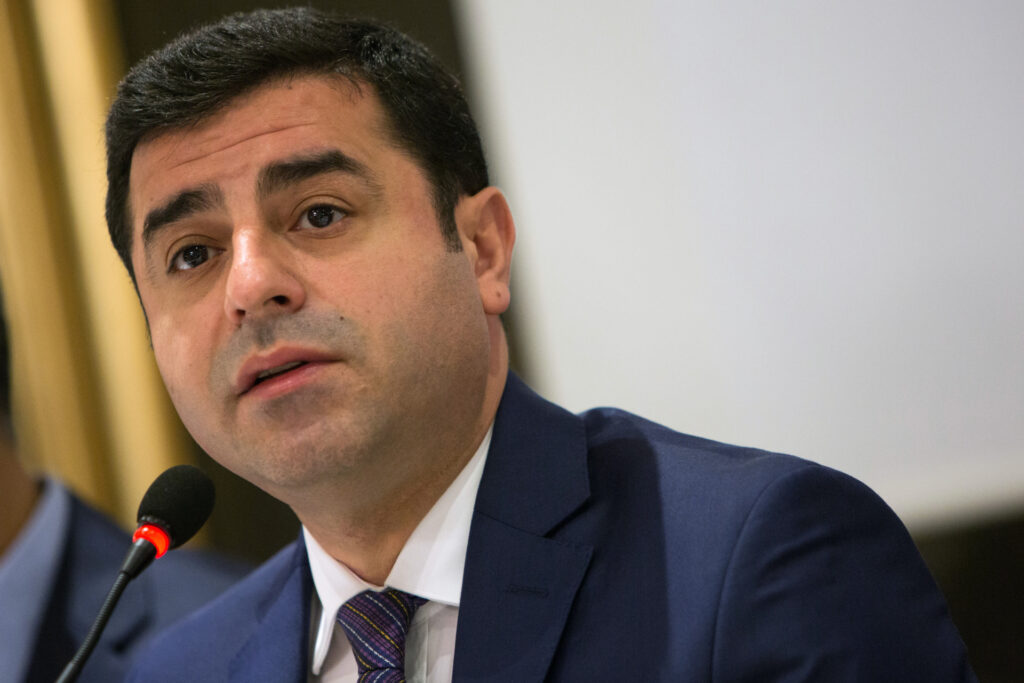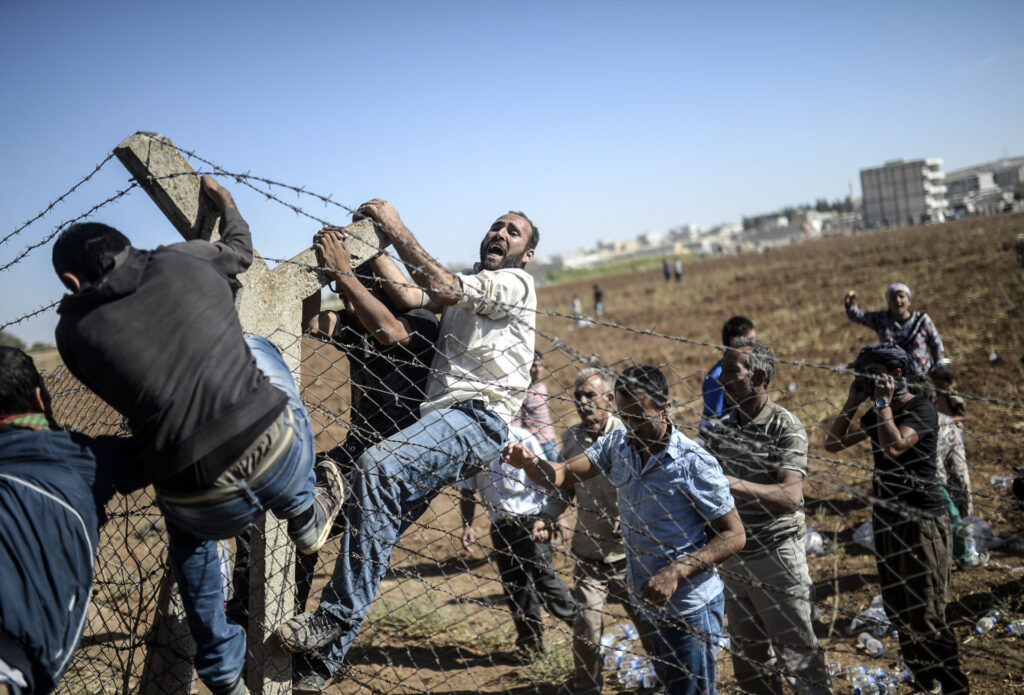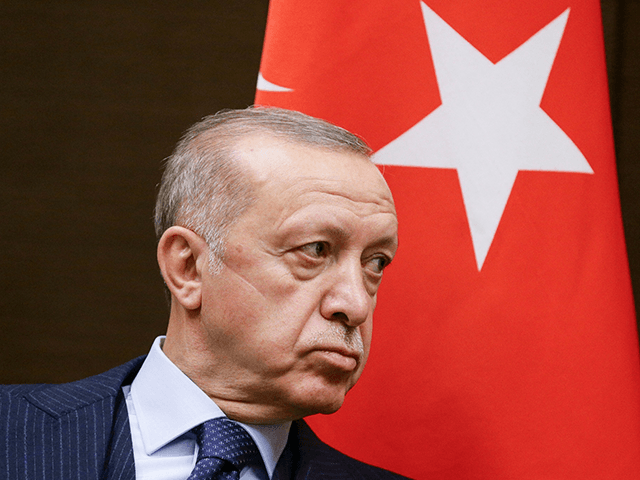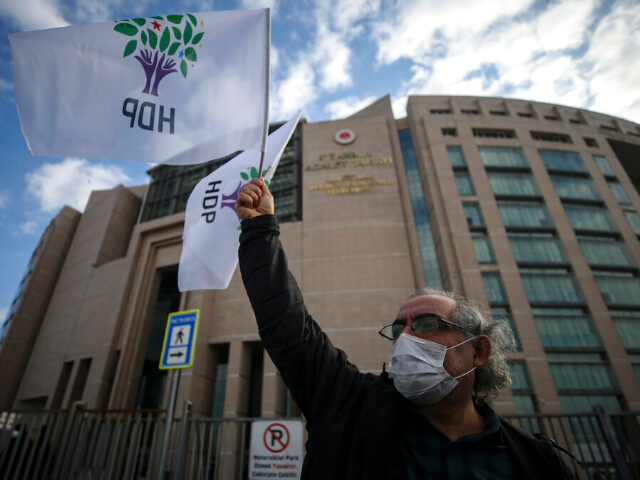Kurdish citizens protested across Turkey after a court sentenced Selahattin Demirtas, former co-chair of the pro-Kurdish People’s Democratic Party (HDP) and two-time presidential candidate, to 42 years in prison.
Officials in 20 provinces banned demonstrations, social gatherings, and public events for four days in a bid to tamp down Kurdish outrage.
Demirtas, 51, has been in prison since 2016. He managed to place third in Turkey’s 2018 presidential election despite being in jail. Shortly after that election, Turkish courts finally got around to convicting him of links to the banned Kurdistan Workers’ Party (PKK), a violent Kurdish separatist group.

Selahattin Demirtas during a meeting in Istanbul, Turkey, on October 28, 2015. (Kerem Uzel/Bloomberg via Getty Images)
The 42-year prison sentence for Demirtas was based on dozens of criminal charges, many of them pertaining to riots in 2014 when the Islamic State was attacking the heavily Kurdish city of Kobane in northeastern Syria.
Turkish Kurds wanted their government to establish a corridor from Turkey’s Kurdistan region to the besieged city so it could receive humanitarian and military assistance. The Turkish government refused, enraging Turkish Kurds who could literally see the fighting in Kobane on the horizon from their homes.

Turkish and Syrian Kurds tear down the border fence to cross into Kobane in neighboring Syria during a demonstration near the Mursitpinar border crossing in Sanliurfa province on September 26, 2014. (BULENT KILIC/AFP via Getty Images)
The ISIS siege of Kobane became a massive humanitarian disaster, as the town was all but obliterated, and thousands of people were killed or displaced. Turkish citizens who blamed their government for not doing enough to help Kobane marched in the streets to denounce President Recep Tayyip Erdogan, who remains in power to this day.
Erdogan does not take such criticism well, so police moved in with excessive force to quell the riots, while some factional squabbles among the demonstrators escalated into street brawls. In the end, 51 people were killed, and hundreds more were injured.

Turkish President Recep Tayyip Erdogan (Vladimir Smirnov, Sputnik, Kremlin Pool Photo via AP)
Demirtas supported the protests on social media, but he spoke out against the violence at the time, helping bring the Kobane protests to a close. The court in Ankara’s suburb of Sincan nevertheless convicted him on Thursday of “attacking the integrity of the state” by helping to cause the riots.
“There’s no single evidence about me. This is a case of political revenge. We were not legally arrested. We are all political hostages,” Demirtas said during his testimony to the court in 2023.
The mass trial had 107 other defendants besides Demirtas. One of them was another former HDP co-chair, Figen Yuksekdag, who was sentenced to 30 years and three months in prison. Another was veteran Kurdish politician Ahmet Turk, who was just elected mayor of a town called Mardin in March. Turk was sentenced to ten years in prison.
Tuncer Bakirhan, current co-chair of the HDP (which was renamed DEM during the long years of Demirtas’ imprisonment) denounced the verdict as a “black stain on the history of Turkish justice” and a “legal massacre.”
Bakirhan accused Erdogan’s government of using the courts to “erase” pro-Kurdish parties from the Turkish political scene.
“We do not recognize this verdict,” said Bakirhan. “Selahattin, Figen, and those on trial in the Kobane case have been acquitted in the hearts of Kurds, Turks, workers, women, and youth. They are free.”
Ozgu Ozel, leader of Turkey’s largest opposition party, the Republican People’s Party (CHP), said the sentences handed down against Demirtas and the others on Thursday were an effort by Erdogan to crush political dissent using the courts.
“It is a case that is suitable for political use in every aspect, with its prolongation, its timing, and the fact that the verdict hearing is postponed until after the election,” he said of the Kobane prosecutions.
“When you look at the sentences given to Selahattin Demirtas and Figen Yuksekdag, there is no acceptable side to the things they are accused of and the sentences they received,” he said.
Erdogan and his ruling Justice and Development Party (AKP) suffered huge losses in 2024’s local elections, prompting Erdogan to speak of “softening” his positions and reconciling with his rivals — promises that opposition leaders, like Ozel and Bakirhan, said were exposed as insincere by the politicized convictions of Demirtas and his fellow defendants.
Human Rights Watch (HRW) slammed Thursday’s convictions as “the latest move in a campaign of persecution that has robbed mainly Kurdish voters of their chosen representatives, undermined the democratic process, and criminalized lawful political speech.”
“Using bogus criminal proceedings to remove democratically elected Kurdish politicians from political life will do nothing to end the Turkish state’s decades-long conflict with the PKK,” said HRW Director for Europe and Central Asia Hugh Williamson.
HRW said the Kobane trial was a blatant violation of international human rights standards since the case file included “unsubstantiated and generalized assertions” from anonymous witnesses and “arbitrary” procedures.
AFP looked wistfully back at the Demirtas saga on Thursday, recalling that his negotiations with the leader of the banned PKK seemed close to ending the separatist insurgency in 2016 — until Erdogan, feeling threatened by Demirtas’ rising popularity, sent a platoon of 200 police officers to arrest him at his home in the Kurdish enclave of Diyarbakir. Erdogan has attempted to ban every pro-Kurdish party as a secret ally of the PKK in the years since then.

COMMENTS
Please let us know if you're having issues with commenting.